Click on images to enlarge

infestation (Photo: Forest and Kim Starr, USGS)

habit (Photo: Matt Taylor)
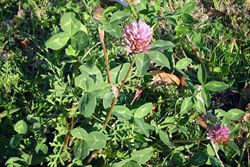
leaves, each with three leaflets, and flower clusters (Photo: Sheldon Navie)
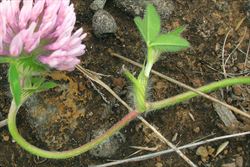
hairy stem (Photo: Forest and Kim Starr, USGS)
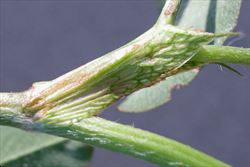
close-up of stem and sheath-like stipules at the base of the leaf stalk (Photo: Greg Jordan)
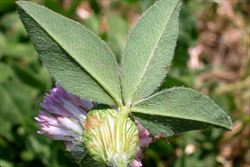
close-up of hairy leaflet undersides (Photo: Greg Jordan)
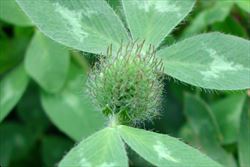
young flower cluster (Photo: Matt Taylor)
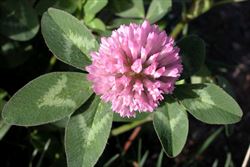
flower cluster and leaflets with paler v-shaped markings (Photo: Greg Jordan)

close-up of flowers (Photo: Matt Taylor)
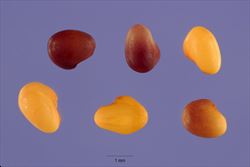
close-up of seeds (Photo: Steve Hurst at USDA PLANTS Database)
Scientific Name
Trifolium pratense L.
Synonyms
Trifolium pratense L. var. pratenseTrifolium pratense L. var. sativum Schreb.
Family
Fabaceae (Queensland, the ACT, Victoria, Tasmania, and the Northern Territory)Fabaceae: sub-family Faboideae (New South Wales)Leguminosae (South Australia)Papilionaceae (Western Australia)
Common Names
cleaver grass, cow clover, cow grass, cowgrass, mammoth red clover, marl grass, meadow clover, meadow honeysuckle, meadow trefoil, medium red clover, peavine clover, purple clover, red clover, sweet clover, trefoil, wild clover
Origin
Native to north-western Africa, Europe, western Asia, Russia and the Indian Sub-continent.
Naturalised Distribution
Widely naturalised in southern and eastern Australia (i.e. in south-eastern Queensland, New South Wales, the ACT, Victoria, Tasmania, south-eastern South Australia and the coastal districts of south-western and southern Western Australia).
Notes
Red clover (Trifolium pratense) is regarded as an environmental weed in Western Australia and Victoria.

